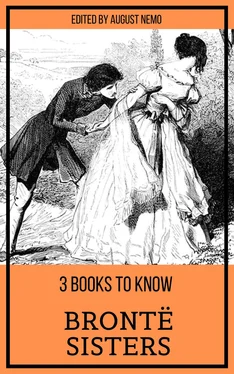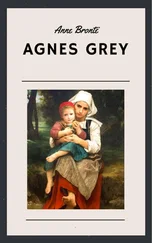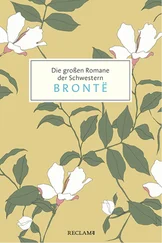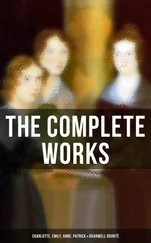February 10th.—It is a hard, embittering thing to have one’s kind feelings and good intentions cast back in one’s teeth. I was beginning to relent towards my wretched partner; to pity his forlorn, comfortless condition, unalleviated as it is by the consolations of intellectual resources and the answer of a good conscience towards God; and to think I ought to sacrifice my pride, and renew my efforts once again to make his home agreeable and lead him back to the path of virtue; not by false professions of love, and not by pretended remorse, but by mitigating my habitual coldness of manner, and commuting my frigid civility into kindness wherever an opportunity occurred; and not only was I beginning to think so, but I had already begun to act upon the thought—and what was the result? No answering spark of kindness, no awakening penitence, but an unappeasable ill-humour, and a spirit of tyrannous exaction that increased with indulgence, and a lurking gleam of self-complacent triumph at every detection of relenting softness in my manner, that congealed me to marble again as often as it recurred; and this morning he finished the business:—I think the petrifaction is so completely effected at last that nothing can melt me again. Among his letters was one which he perused with symptoms of unusual gratification, and then threw it across the table to me, with the admonition,—
‘There! read that, and take a lesson by it!’
It was in the free, dashing hand of Lady Lowborough. I glanced at the first page; it seemed full of extravagant protestations of affection; impetuous longings for a speedy reunion—and impious defiance of God’s mandates, and railings against His providence for having cast their lot asunder, and doomed them both to the hateful bondage of alliance with those they could not love. He gave a slight titter on seeing me change colour. I folded up the letter, rose, and returned it to him, with no remark, but—
‘Thank you, I will take a lesson by it!’
My little Arthur was standing between his knees, delightedly playing with the bright, ruby ring on his finger. Urged by a sudden, imperative impulse to deliver my son from that contaminating influence, I caught him up in my arms and carried him with me out of the room. Not liking this abrupt removal, the child began to pout and cry. This was a new stab to my already tortured heart. I would not let him go; but, taking him with me into the library, I shut the door, and, kneeling on the floor beside him, I embraced him, kissed him, wept over with him with passionate fondness. Rather frightened than consoled by this, he turned struggling from me, and cried out aloud for his papa. I released him from my arms, and never were more bitter tears than those that now concealed him from my blinded, burning eyes. Hearing his cries, the father came to the room. I instantly turned away, lest he should see and misconstrue my emotion. He swore at me, and took the now pacified child away.
It is hard that my little darling should love him more than me; and that, when the well-being and culture of my son is all I have to live for, I should see my influence destroyed by one whose selfish affection is more injurious than the coldest indifference or the harshest tyranny could be. If I, for his good, deny him some trifling indulgence, he goes to his father, and the latter, in spite of his selfish indolence, will even give himself some trouble to meet the child’s desires: if I attempt to curb his will, or look gravely on him for some act of childish disobedience, he knows his other parent will smile and take his part against me. Thus, not only have I the father’s spirit in the son to contend against, the germs of his evil tendencies to search out and eradicate, and his corrupting intercourse and example in after-life to counteract, but already he counteracts my arduous labour for the child’s advantage, destroys my influence over his tender mind, and robs me of his very love; I had no earthly hope but this, and he seems to take a diabolical delight in tearing it away.
But it is wrong to despair; I will remember the counsel of the inspired writer to him ‘that feareth the Lord and obeyeth the voice of his servant, that sitteth in darkness and hath no light; let him trust in the name of the Lord, and stay upon his God!’
––––––––
DECEMBER 20TH, 1825.—Another year is past; and I am weary of this life. And yet I cannot wish to leave it: whatever afflictions assail me here, I cannot wish to go and leave my darling in this dark and wicked world alone, without a friend to guide him through its weary mazes, to warn him of its thousand snares, and guard him from the perils that beset him on every hand. I am not well fitted to be his only companion, I know; but there is no other to supply my place. I am too grave to minister to his amusements and enter into his infantile sports as a nurse or a mother ought to do, and often his bursts of gleeful merriment trouble and alarm me; I see in them his father’s spirit and temperament, and I tremble for the consequences; and too often damp the innocent mirth I ought to share. That father, on the contrary, has no weight of sadness on his mind; is troubled with no fears, no scruples concerning his son’s future welfare; and at evenings especially, the times when the child sees him the most and the oftenest, he is always particularly jocund and open-hearted: ready to laugh and to jest with anything or anybody but me, and I am particularly silent and sad: therefore, of course, the child dotes upon his seemingly joyous amusing, ever-indulgent papa, and will at any time gladly exchange my company for his. This disturbs me greatly; not so much for the sake of my son’s affection (though I do prize that highly, and though I feel it is my right, and know I have done much to earn it) as for that influence over him which, for his own advantage, I would strive to purchase and retain, and which for very spite his father delights to rob me of, and, from motives of mere idle egotism, is pleased to win to himself; making no use of it but to torment me and ruin the child. My only consolation is, that he spends comparatively little of his time at home, and, during the months he passes in London or elsewhere, I have a chance of recovering the ground I had lost, and overcoming with good the evil he has wrought by his wilful mismanagement. But then it is a bitter trial to behold him, on his return, doing his utmost to subvert my labours and transform my innocent, affectionate, tractable darling into a selfish, disobedient, and mischievous boy; thereby preparing the soil for those vices he has so successfully cultivated in his own perverted nature.
Happily, there were none of Arthur’s ‘friends’ invited to Grassdale last autumn: he took himself off to visit some of them instead. I wish he would always do so, and I wish his friends were numerous and loving enough to keep him amongst them all the year round. Mr. Hargrave, considerably to my annoyance, did not go with him; but I think I have done with that gentleman at last.
Конец ознакомительного фрагмента.
Текст предоставлен ООО «ЛитРес».
Прочитайте эту книгу целиком, купив полную легальную версию на ЛитРес.
Безопасно оплатить книгу можно банковской картой Visa, MasterCard, Maestro, со счета мобильного телефона, с платежного терминала, в салоне МТС или Связной, через PayPal, WebMoney, Яндекс.Деньги, QIWI Кошелек, бонусными картами или другим удобным Вам способом.











